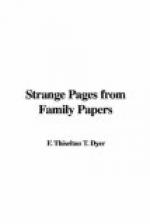But vows have not always been broken with impunity. Janet Dalrymple, daughter of the first Lord Stair, secretly engaged herself to Lord Rutherford, who was not acceptable to her parents, either on account of his political principles, or his want of fortune. The young couple broke a piece of gold together, and pledged their troth in the most solemn manner, the young lady, it is said, imprecating dreadful evils on herself should she break her plighted faith. But shortly afterwards another suitor sought the hand of Janet Dalrymple, and, when she showed a cold indifference to his overtures, her mother, Lady Stair, insisted upon her consenting to marry the new suitor, David Dunbar, son and heir of David Dunbar of Baldoon, in Wigtonshire. It was in vain that Janet Dalrymple confessed her secret engagement, for Lady Stair treated this objection as a mere trifle.
Lord Rutherford, apprised of what had happened, interfered by letter, and insisted on the right he had acquired by his troth plighted with Janet Dalrymple. But Lady Stair answered in reply that “her daughter, sensible of her undutiful behaviour in entering into a contract unsanctioned by her parents, had retracted her unlawful vow, and now refused to fulfil her engagement with him.” Lord Rutherford wrote again to Lady Stair, and briefly informed her that “he declined positively to receive such an answer from anyone but Janet Dalrymple,” and, accordingly, an interview was arranged between them, at which Lady Stair took good care to be present, with pertinacity insisting on the Levitical law, which declares that a woman shall be free of a vow which her parents dissent from.




